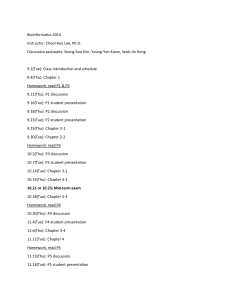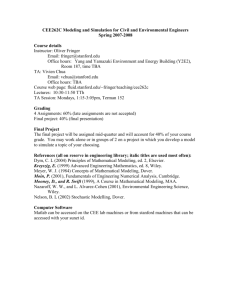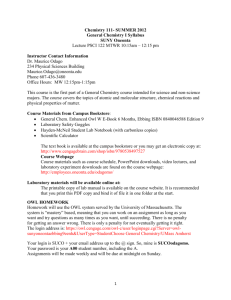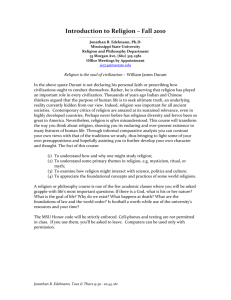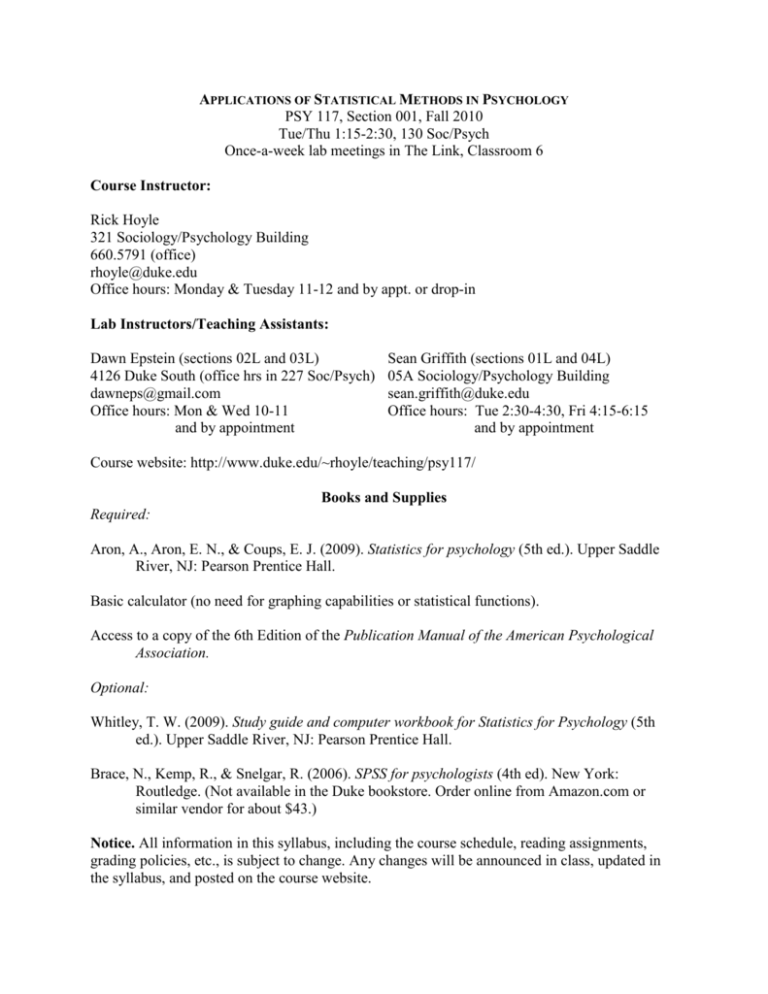
APPLICATIONS OF STATISTICAL METHODS IN PSYCHOLOGY
PSY 117, Section 001, Fall 2010
Tue/Thu 1:15-2:30, 130 Soc/Psych
Once-a-week lab meetings in The Link, Classroom 6
Course Instructor:
Rick Hoyle
321 Sociology/Psychology Building
660.5791 (office)
rhoyle@duke.edu
Office hours: Monday & Tuesday 11-12 and by appt. or drop-in
Lab Instructors/Teaching Assistants:
Dawn Epstein (sections 02L and 03L)
4126 Duke South (office hrs in 227 Soc/Psych)
dawneps@gmail.com
Office hours: Mon & Wed 10-11
and by appointment
Sean Griffith (sections 01L and 04L)
05A Sociology/Psychology Building
sean.griffith@duke.edu
Office hours: Tue 2:30-4:30, Fri 4:15-6:15
and by appointment
Course website: http://www.duke.edu/~rhoyle/teaching/psy117/
Books and Supplies
Required:
Aron, A., Aron, E. N., & Coups, E. J. (2009). Statistics for psychology (5th ed.). Upper Saddle
River, NJ: Pearson Prentice Hall.
Basic calculator (no need for graphing capabilities or statistical functions).
Access to a copy of the 6th Edition of the Publication Manual of the American Psychological
Association.
Optional:
Whitley, T. W. (2009). Study guide and computer workbook for Statistics for Psychology (5th
ed.). Upper Saddle River, NJ: Pearson Prentice Hall.
Brace, N., Kemp, R., & Snelgar, R. (2006). SPSS for psychologists (4th ed). New York:
Routledge. (Not available in the Duke bookstore. Order online from Amazon.com or
similar vendor for about $43.)
Notice. All information in this syllabus, including the course schedule, reading assignments,
grading policies, etc., is subject to change. Any changes will be announced in class, updated in
the syllabus, and posted on the course website.
Fall 2010
Appl of Stat Meth in Psy
page 2
Description and Goals of the Course
This course, required for the psychology major, provides an introduction to statistical methods
commonly used in psychological research. Topics in applied statistical methods that will be
covered include,
measures of central tendency and variability
probability and distributions
confidence intervals and hypothesis testing
t-test and analysis of variance
correlation and regression
χ2 tests
Students will learn to calculate and interpret statistics with reference to data and research
questions typical in psychological research. The course includes a weekly lab meeting that
provides instruction in the management and analysis of psychological data using statistical
software designed for use in behavioral science research.
The course is designed to fulfill these goals:
develop an appreciation for the vital role of statistical methods in psychological science
master fundamental concepts in statistical reasoning
learn how statistical methods are used to test hypotheses
understand the computation of statistical tests, confidence intervals, and effect sizes for
statistical methods commonly used in psychological research
gain experience using widely available statistical software for analyzing data
learn to translate and interpret statistical results for reports and presentations
Elements of the Course
Textbook
We will cover material from 13 chapters in the textbook. You are strongly encouraged to read
the section assigned for each class meeting (see course outline below) at least twice—before the
class meeting and again after we have covered the material in class. Accompanying each chapter
are practice problems and exercises. A few of these will be assigned in homework problem sets.
The others are available to do on your own or with study partners and, if you find yourself
struggling with any of the material, you should use the relevant problems and exercises to build
understanding and develop mastery.
Attendance at Class Meetings
Attendance at all class meetings is expected but will not be monitored. Although this course
makes good use of an excellent textbook, it does not rely exclusively on material in the book;
thus, missing class will mean missing material you will be expected to know. Moreover, we will
Fall 2010
Appl of Stat Meth in Psy
page 3
do occasional exercises in class meetings that could not be duplicated by copying another
student’s note. You are strongly encouraged to attend every class meeting. Class meetings will
begin promptly at 1:15. Because the entrance to the classroom is at the front through a noisy
door, late arrivals are disruptive. It is better to be late than to not come at all, but make every
effort to be in your seat and ready to begin by 1:15.
Meetings with Instructor/TAs
You are encouraged to meet with the instructor or one of the teaching assistants any time you
feel you could benefit from such a meeting. Although the number of posted office hours per
week is small, the instructor and TAs are available and willing to meet with you at other times. If
you would like to discuss the course in general or material presented during class meetings, then
you can meet with the instructor or either of the TAs. If you need help with a problem set or an
SPSS assignment, then you will find it most beneficial to meet with the TA that is your lab
instructor. Such meetings can be arranged by email or immediately following class or lab
meeting. Although we are available and reasonably flexible, please do not expect immediate
replies to email messages, especially those sent just prior to class or your lab meeting.
Lab Meetings
Every student is enrolled in one of four lab sections. All sections meet once a week in The Link
(Classroom 6), located on the lower level of Perkins Library (info here: http://link.duke.edu).
Lab meeting times and instructors are as follows:
01L—Thu 2:50-4:05, Griffith
02L—Thu 4:25-5:40, Epstein
03L—Fri 8:30-9:45, Epstein
04L—Fri 2:50-4:05, Griffith
The lab meetings are a critical component of the course, and therefore attendance is required.
During these meetings, the instructor will review material from class meetings, teach you how to
use the statistical software SPSS, and occasionally present new material. Attendance will be
taken at all lab meetings and contribute a small amount to your grade for the course (attendance
policy on page 5). Your lab attendance grade will begin at 100, then be reduced to 90 following
one absence, 80 following a second absence, and zero following a third absence.
Problem Sets
Statistical methods, particularly as they are applied in research, are best learned through practice.
As such, the textbook and lectures will be supplemented by a series of problem sets, which are to
be completed outside of class and will be reviewed during meetings of lab sections. The activity
of completing these homework assignments serves a diagnostic purpose while preparing you for
exams and other assignments. Problems sets are due at the beginning of the class meeting before
the lab meeting at which they are covered and will only be accepted at this time unless you have
an excuse that meets standard university criteria. Problem sets will be graded as follows:
0—not completed, or handed in late
1—handed in on time but not complete
Fall 2010
Appl of Stat Meth in Psy
page 4
2—handed in on time, complete, but includes some mistakes
3—handed in on time, complete, and no mistakes
Your performance on the problem sets, coupled with your attendance at lab meetings, will
account for 15% of your grade for the course.
Exams
The course is divided into four units that cover equivalent amounts of material (three chapters
each except for the fourth unit, which will cover parts of four chapters). For each unit of study
there will be a paper-and-pencil exam comprising multiple choice and short answer items. The
latter will include brief computational problems and questions that require a written response.
The fourth exam will be administered at the scheduled time for the final exam (see course outline
below), but it will not be cumulative (although it will be a bit longer and count more toward your
course grade because it will cover more material than the first three exams). Collectively, exam
grades will account for 65% of your grade for the course.
Paper
You will prepare to hand in at the last class meeting of the semester a short paper in which you
report the results of a simple set of statistical analyses. In order to complete the paper
successfully, you will have to run the analyses using data provided for you. You will then report
the findings in a results section typical of those in professional journal articles published by
psychological scientists. Your paper will need to be formatted in APA style. You will be
expected to include at least one table and one figure, and include the output of your SPSS runs in
an appendix. Your grade on the paper will contribute 20% to your grade for the course.
Course Grades
Your grade for the course will be based on the total percentage of points you earn on six graded
activities, weighted as follows:
Exam 1: 15%
Exam 2: 15%
Exam 3: 15%
Lab/problem sets: 15%
Paper: 20%
Final exam: 20%
Grades will be distributed as follows:
Grade
A
AB+
B
% Range
93.0-100.0
90.0 - 92.9
87.0 - 89.9
83.0 - 86.9
Grade
BC+
C
C-
% Range
80.0 - 82.9
77.0 - 79.9
73.0 - 76.9
70.0 - 72.9
Grade
D+
D
DF
% Range
67.0 - 69.9
63.0 - 66.9
60.0 - 62.9
00.0 - 59.9
Fall 2010
Appl of Stat Meth in Psy
page 5
Policies and Procedures
Academic Integrity
Please be sure you understand and act in accordance with Duke’s Community Standard
(http://www.integrity.duke.edu/new.html). Paraphrasing the published standard, this means you
will (1) not lie, cheat, or steal on graded work, (2) conduct yourself honorably in all aspects of
the course, and (3) act if the Standard is compromised.
Missing Graded Work
If, for brief and temporary health reasons, you are unable to take an exam (except the final exam)
or complete a graded assignment you are to complete the web-based Short-Term Illness
Notification Form. (The form is not to be used for simply missing class for health reasons.) You
should submit the form prior to the class in which the graded assignment is due or will occur.
Submitting the form requires stating that you are adhering to the Duke Community Standard.
Upon submission, copies of the form are sent by email to the course instructor and the Trinity
academic deans. Information about the policy and access to the form can be found online at
http://www.aas.duke.edu/cgi-bin/trinity/t-reqs/illness/form.pl If illness leaves you unable to
complete the final exam at the scheduled time, you must make arrangements with your academic
dean.
Lab Attendance Policy
Unless you have prior approval from you lab instructor, you must attend the lab section in which
you are enrolled in order not to be counted absent.
Prior approval will be granted for reasons that ordinarily would qualify as university recognized
excused absences. These include athletic participation and professional interviews for which you
do not control scheduling.
Prior approval will come with either permission to attend another lab section in the same week
during which you will miss the meeting of your lab sections or, if this is not possible, a makeup
assignment to be done on your own time but before the next lab meeting. Note that all lab
sections are full; thus, it might not be possible for you to attend an alternative lab meeting even if
your schedule would permit it. You must get prior approval to do so.
If you miss a lab meeting due to illness, you have two options:
1. If you are in a Thursday section, contact the lab instructor for the Friday sections and
ask for approval to attend one of those lab meetings.
2. If you are in a Friday section or in a Thursday section but unable to make it up by
attending a Friday section, you will need to make it up by doing a makeup assignment on your
own time but before the next lab meeting.
Fall 2010
Appl of Stat Meth in Psy
page 6
Appealing Grades
Although we are not willing to negotiate grades, we are willing to correct any grading errors.
Errors that we will corrected promptly when they are brought to our attention (but no later than 7
days after the grade is made known to you) include the following:
points earned on individual components of the graded work were not added correctly
you indicated or wrote the correct answer but the grader did not see it
your written answer is correct but was not interpreted as such by the grader
We are not willing to consider the following appeals:
dissatisfaction with the number of points lost
dissatisfaction with how questions were worded
Religious Holidays
If you will miss class in observance of a religious holiday, please notify the course instructor
and/or relevant lab instructor prior to the date in question by submitting a Religious Observance
Notification Form, which you can obtain online at http://www.aas.duke.edu/cgi-bin/trinity/treqs/rholiday/form.pl
Student-Athlete Travel
Student athletes who will need to miss class or lab meetings during the semester due to travel
should work with the course instructor or relevant lab instructor as soon as possible to arrange
for making up work that will be missed and rescheduling assignments due on days they will be
absent. You can find the Notification of Varsity Athletic Participation form online at
http://www.aas.duke.edu/cgi-bin/trinity/t-reqs/novap/form.pl
Fall 2010
Appl of Stat Meth in Psy
page 7
Course Outline
1. Tue, Aug 31
introduction to the course and instructors
data collection
role of statistics in psychological science
2. Thu, Sept 2
visual displays of data
3. Tue, Sept 7
characterizing distributions: central tendency
4. Thu, Sept 9
characterizing distributions: variability
5. Tue, Sept 14
Z scores and the normal distribution
6. Thu, Sept 16
sampling and probability
7. Tue, Sept 21
Exam 1
8. Thu, Sept 23
logic of hypothesis testing
9. Tue, Sept 28
significance testing
statistical tests using the Z distribution
10. Thu, Sept 30
confidence intervals; std error of measurement
11. Tue, Oct 5
inference; effect sizes; meta-analysis
12. Thu, Oct 7
introduction to statistical power
13. Thu, Oct 14
influences on statistical power
14. Tue, Oct 19
Exam 2
15. Thu, Oct 21
t-test for a single sample
16. Tue, Oct 26
t-test for dependent means
17. Thu, Oct 28
standard error of the t-test for independent means
18. Tue, Nov 2
independent means comparisons using t
19. Thu, Nov 4
χ2 test for goodness of fit
20. Tue, Nov 9
χ2 test for independence
21. Thu, Nov 11
logic of analysis of variance (ANOVA)
22. Tue, Nov 16
Exam 3
23. Thu, Nov 18
hypothesis tests and comparisons in ANOVA
24. Tue, Nov 23
power and effect size in ANOVA
raw score approach to ANOVA
25. Tue, Nov 30
interaction effects in factorial ANOVA
26. Thu, Dec 2
correlation
27. Tue, Dec 7
simple regression
28. Thu, Dec 9
logic of multiple regression
papers due by the beginning of class
Sat, Dec 18 (7-10pm) Final exam
syllabus
Chapter 1
Chapter 2, pp. 33-42
Chapter 2, pp. 43-57
Chapter 3, pp. 67-83
Chapter 3, pp. 83-96
Chapter 4, pp. 107-118
Chapter 4, pp. 119-129
Chapter 5, pp. 137-154
Chapter 5, pp. 154-164
Chapter 6, pp. 175-186
Chapter 6, pp. 187-207
Chapter 6, pp, 208-215
Chapter 7, pp. 222-236
Chapter 7, pp. 236-254
Chapter 8, pp. 270-278
Chapter 8, pp. 278-295
Chapter 13, pp. 536-546
Chapter 13, pp. 546-561
Chapter 9, pp. 310-325
Chapter 9, pp. 327-338
Chapter 9, pp. 339-342
Chapter 9, pp. 345-350
Chapter 10, pp. 370-404
Chapter 11, pp. 432-463
Chapter 12, pp. 487-505
Chapter 12, pp. 506-517



